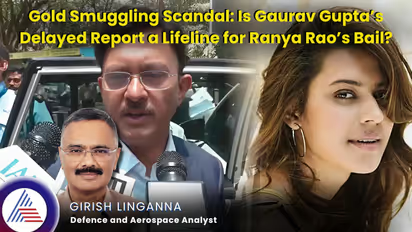Gold smuggling scandal: Is Gaurav Gupta's delayed report a lifeline for Ranya Rao? | Opinion

Synopsis
The delay in submitting the inquiry report on Ranya Rao’s gold smuggling case raises legal and political questions, potentially impacting her bail plea and the investigation’s credibility.
The high-profile gold smuggling case involving Kannada actor Ranya Rao has taken yet another intriguing turn as Additional Chief Secretary Gaurav Gupta, tasked with investigating alleged protocol violations at Kempegowda International Airport (KIA), has yet to submit his inquiry report to the Karnataka government. On March 24, 2025, Gupta assured the media that the report was "almost completed" and would be submitted "today itself" after final details were reviewed. However, as of March 26, 2025, the report remains unsubmitted, raising questions about the timing and its potential implications—particularly with Ranya Rao’s bail hearing scheduled for today. This delay, whether intentional or procedural, warrants a judicial examination, especially given the legal complexities and the possibility that it could bolster Rao’s defense in her ongoing battle for bail.
Ranya Rao was arrested on March 3, 2025, by the Directorate of Revenue Intelligence (DRI) at KIA upon her arrival from Dubai. Authorities seized 14.2 kg of foreign-origin gold bars, valued at ₹12.56 crore, concealed on her person using crepe bandages and tape. The case gained significant attention due to Rao’s alleged misuse of protocol privileges linked to her stepfather, K. Ramachandra Rao, a Director-General of Police with the Karnataka State Police Housing Corporation. The Karnataka government responded swiftly, commissioning Gupta on March 10 to probe these violations and Rao’s stepfather’s potential involvement. The inquiry committee, which included questioning Ramachandra Rao before his forced leave, was expected to deliver a comprehensive report within a week—a deadline that has long passed.
Gupta’s public statements on March 24 suggested confidence in the investigation’s thoroughness, noting that 10-15 individuals were involved in the probe and that there was "no evasion, no pressure from anyone." He also hinted at recommendations for enhancing security protocols. Yet, the failure to submit the report by the promised date has sparked speculation. Could this delay be a strategic move to support Ranya Rao’s bail plea? From a judicial standpoint, the timing is critical and must be scrutinized through a legal lens.
Rao’s legal team has consistently argued procedural lapses in her arrest and interrogation, citing violations of Supreme Court guidelines from the DK Basu case, which mandate clear grounds for arrest. The absence of Gupta’s report—potentially a key piece of evidence regarding the extent of protocol misuse and any official complicity—could strengthen this defense. If the report remains unavailable, the court may lack a complete picture of the systemic failures or official involvement that facilitated the smuggling attempt. This gap could tilt the scales in Rao’s favor, as the prosecution’s case might appear less robust without concrete findings to counter her claims of unfair treatment.
Legally, the delay raises questions of due process. The Karnataka government’s directive to Gupta was clear: investigate and report swiftly. A prolonged delay risks undermining the state’s credibility and could be perceived as an attempt to shield influential figures, including Ramachandra Rao, whose role remains under scrutiny. The DRI has opposed Rao’s bail, arguing her flight risk—evidenced by her 27 trips to Dubai since January 2025—and potential to tamper with witnesses. However, without Gupta’s findings, the court may struggle to assess the full scope of the smuggling operation, including whether it was an isolated act or part of a larger syndicate, as the DRI alleges.
From a judicial perspective, the delay could also signal administrative inefficiency rather than deliberate intent. Compiling a report involving multiple stakeholders—customs officials, police personnel, and airport authorities—requires meticulous cross-verification. Yet, Gupta’s assurance of an imminent submission suggests the bulk of the work was complete, making the continued hold-up puzzling. Courts often view such delays skeptically, especially in cases with public and political ramifications, as this one has with BJP and Congress trading accusations of ministerial involvement.
For Rao’s bail hearing today, the absence of the report could be a double-edged sword. Her counsel might argue that the state’s failure to produce it reflects a lack of evidence against her, reinforcing claims of procedural irregularity. Conversely, the DRI could assert that the ongoing investigation’s complexity justifies denying bail, given the national security implications of a potential smuggling syndicate. Judicially, the court must balance these arguments, ensuring Rao’s rights are protected while safeguarding the investigation’s integrity.
In conclusion, Gaurav Gupta’s delay in submitting the report demands careful judicial consideration. Whether it inadvertently aids Rao’s bail plea or reflects genuine procedural hurdles, it underscores the need for transparency and timeliness in such cases. The court, in its wisdom, must weigh this anomaly against the evidence at hand, ensuring justice prevails in a case that has gripped Karnataka’s legal and political landscape.
(The author Girish Linganna is an award-winning Science Writer and a Defence, Aerospace & Political Analyst based in Bengaluru. He is also Director of ADD Engineering Components, India, Pvt. Ltd, a subsidiary of ADD Engineering GmbH, Germany. You can reach him at: girishlinganna@gmail.com)
Stay updated with the Breaking News Today and Latest News from across India and around the world. Get real-time updates, in-depth analysis, and comprehensive coverage of India News, World News, Indian Defence News, Kerala News, and Karnataka News. From politics to current affairs, follow every major story as it unfolds. Download the Asianet News Official App from the Android Play Store and iPhone App Store for accurate and timely news updates anytime, anywhere.